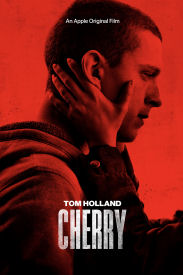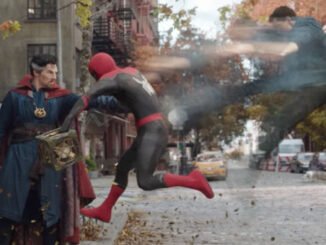 Cherry opens today in theaters and comes to Apple TV Plus on March 12.
Cherry opens today in theaters and comes to Apple TV Plus on March 12.
Cherry, from directors Joe and Anthony Russo, tracks the story of an aimless young man (Tom Holland) who drifts from college to the Army to drug addiction and armed bank robbery upon his return form a Middle East war zone. The film is broken into several chapters, each with their own stylized look and feel. But there is no real visual continuity between each segment, no thread that unites the various pieces into a cohesive whole. The various story points bounce around as Cherry jumps from college student to Army inductee to battlefield medic to returning vet to junkie bank robber. It all feels like riffs on everything from Jarhead and Full Metal Jacket to Trainspotting, Lock, Stock And Two Smoking Barrels and Pulp Fiction. We’ve seen it all before, and done better.
The fragmented state of the narrative also makes it hard to keep invested in Cherry. There is just no unbroken throughline to the thread of his character, as he jumps forward with each new chapter. Even more distressing is it seems as if the film itself doesn’t care about Cherry’s girlfriend Emily at all. Whereas Cherry at least gets a small, if unsatisfying, redemption arc that consists entirely of a montage towards the end of the film, we get nothing for Emily. She just shows up seemingly all better, which is a shame as actress Clara Bravo manages to do good work with the underwritten part she is given.
Ostensibly, the film seems to want to be about how society society mistreats soldiers returning from overseas combat zones through both a monolithic Veterans Administration system that doesn’t serve their needs and through the casual neglect of businesses on the homefront. But the film tries to make its point in such hamfisted ways. The doctor whom Cherry sees about his Post-Traumatic Stress Disorder is named simply “Dr. Whomever.” The banks he holds up are named “Credit None” and “Shitty Bank.” This is South Park level of satire, strictly surface-y, throwaway jokes.
As a drama about addiction and trauma, the film is remarkably sparse, surprising given its run time of two hours and twenty minutes. Cherry’s descent into drug abuse is somewhat handwaved away by saying it is because of his PTSD, but it never really digs into that. There is lots of dramatic meat that is left on the bone. If the intent in being dismissive to the deeper issues here is the narratives way of illustrating how Cherry’s own issues being overlooked by the VA, than it fails to work.
There is definitely material here for a good, honest and compelling story. The semi-autobiographical novel from Nico Walker the film is based on was undoubtedly received well by critics for a reason. Unfortunately, it feels as if the Russo brothers, in their first step away from the Marvel Cinematic Universe in a decade, were all too anxious to show that they have other tricks up their cinematic sleeves. And like Cherry himself, they were their own worse enemies.





